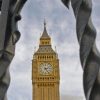Vietnamese authorities have arrested Pham Doan Trang – one of the nation’s most prominent independent journalists.
Trang was detained on Tuesday evening in Ho Chi Minh City, the same day Vietnam and the US held the 24th annual US-Vietnam human rights dialogue, which included talks on issues such as the right to freedom of expression.
Analysts say her arrest is part of a crackdown on activists ahead of Vietnam’s five-yearly national congress in January, while Facebook is facing criticism for growing increasingly complicit in suppressing freedom of speech.
Vietnamese authorities confirmed on Wednesday that they had charged Trang with “making, storing, distributing or disseminating information, documents and items” that aim to oppose the Vietnamese state. The harshest sentence for this crime is 20 years in jail.
How Vietnam hopes to open to trade – by opening up its prisons to scrutiny
Read more
Trang is the author of numerous books whose work covers everything from women’s rights and LGBT issues to environmental concerns, activism and land rights. In 2019, Reporters Without Borders awarded her a Press Freedom Prize in recognition of her impact.
Most recently, she spoke out online about a highly sensitive land rights clash in Dong Tam Village – related to the construction of a military airport on farmland claimed by villagers on the outskirts of Hanoi – in which one villager and three policemen lost their lives.
Phil Robertson at Human Rights Watch said: “Despite suffering years of systemic government harassment, including severe physical attacks, she has remained faithful to her principles of peaceful advocacy for human rights and democracy. Her thoughtful approach to reforms, and demands for people’s real participation in their governance, are messages the Vietnam government should listen to and respect, not repress.”
Ming Yu Hah at Amnesty International said: “This is an outrageous arrest. Pham Doan Trang is a leading figure in the struggle for human rights in Vietnam. She has inspired countless young activists to speak up for a more just, inclusive and free Vietnam.”
Yu Hah told the Guardian Facebook’s decision to cave into Vietnamese authorities’ demands for censorship earlier this year makes them complicit in the country’s harsh repression of freedom of expression.
“We have documented a persistent rise in the censorship of legitimate commentary on social and political affairs on the platform since 2018, with a particularly sharp increase in 2020,” she added. “Merely sharing information about Vietnam’s many serious human rights problems, from land disputes to the death penalty, now regularly leads to arbitrary censorship on Facebook.”
In March this year, a Reuters report revealed how Facebook faced intense pressure from the Vietnamese government. State-run telecommunications companies took the social media site’s local servers offline, which slowed local traffic on the site to a crawl. Consequently, the company began allowing censorship in Vietnam of content deemed “anti-state”, including those by activists like Trang.
The company stresses that the posts are not deleted but rather “geo-blocked”, which means they cannot be seen by users with a Vietnamese IP address, yet still appear to users overseas.
On occasion, geo-blocking has affected not only critical posts but also individual profiles. On 8 January, Bui Van Thuan, a Vietnamese Facebook user who gained tens of thousands of followers after posting content critical of the government, received a notification from the site informing him that “due to legal requirements” in Vietnam, it would “restrict access” to his profile.
In the weeks preceding this exchange, Thuan had spoken openly on Facebook about the land rights clash in Dong Tam. More specifically, he predicted a crackdown was imminent. Two days later, around 3,000 police raided Dong Tam Village at dawn and, in the ensuing battle, the three police and villager leader died.
Fast forward eight months, and the murder trial held over the clash finally reached its verdict. Two brothers, sons of the village leader killed in the raid, were sentenced to death. Thuan’s Facebook account remained restricted all this time, and was only unblocked a few days after the trial ended.
A Facebook company spokesperson said Thuan’s account was blocked in error and the timing of the lifting of restrictions was coincidental. The spokesperson also denied censoring profiles under any agreement with the government.
Vietnam is in the process of finalising guidelines for its highly controversial cybersecurity law, which requires internet companies like Facebook and Google to remove content deemed “anti-state” and says the US tech giants will have to set up local offices and servers in Vietnam if they wish to continue operating – a request the organisations have refused to carry out.
Carl Thayer, professor emeritus at the University of New South Wales Canberra and a south-east Asia expert, said that since Vietnam began implementing its cybersecurity law in 2019 there had been “a marked rise in the arrest and trial of Vietnamese who have gone online to express their views on a number of social issues, particularly corruption and the environment”.
“Most arrests are indirectly related to the forthcoming national party congress [in January]” Thayer said, referring to the country’s most significant political event, during which the Communist party of Vietnam agrees a new five-year economic plan and assigns prominent roles such as the next general secretary of the politburo, president, and prime minister.
“In other words,” he said, “the arrests are part of a continuing process of stamping out dissent on sensitive social issues and deterring others from following suit. It is likely that there will be a spike in arrests in coming months as the congress draws near.”























































Свежие комментарии